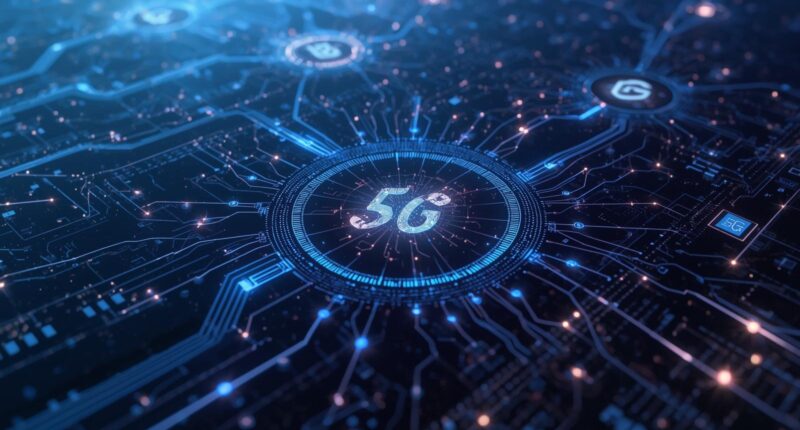The Role of 5G in the Future of Financial Technology
The rise of 5G technology is set to revolutionize many industries, and one of the most impacted sectors will be financial technology (FinTech). From faster mobile banking to advanced blockchain applications, the role of 5G in the future of financial technology will reshape how people access, manage, and invest their money.
This article explores how 5G will influence the FinTech ecosystem, the opportunities it creates, and the challenges that come with it.
What is 5G and Why Does It Matter for FinTech?
5G is the fifth generation of mobile networks, offering speeds up to 100 times faster than 4G, ultra-low latency, and the ability to connect millions of devices simultaneously. These capabilities make it especially valuable for digital payments, trading platforms, and decentralized finance (DeFi).
For the FinTech industry, 5G means:
-
Real-time transactions with minimal delays.
-
Better security for mobile banking.
-
Enhanced user experience through apps and platforms.
The Impact of 5G on Financial Technology
1. Faster Mobile Payments
With 5G, mobile wallets and payment apps will process transactions instantly, reducing the chances of errors or declined payments.
2. Enhanced Security
Stronger network architecture combined with 5G’s encryption capabilities can reduce fraud and cyberattacks in mobile banking and online payments.
3. Seamless Digital Banking
Banks and financial service providers can offer faster, more reliable mobile apps. This includes biometric security, instant verification, and personalized AI-driven services.
4. Boosting Blockchain and DeFi
Blockchain-based systems, such as smart contracts and decentralized finance, require high processing speeds. With 5G, these networks can function more efficiently and scale faster.
(📌 Related Link: The Psychology of Spending in a Cashless World)
5. Real-Time Trading and Investments
Stock trading, cryptocurrency exchanges, and robo-advisors will all benefit from 5G’s low latency, giving investors real-time market updates and quicker execution.
Advantages of 5G in FinTech
-
Instant Payments – Near-zero transaction delays.
-
High-Speed Data Transfers – Better for AI-driven financial analysis.
-
Wider Financial Inclusion – Improved connectivity in rural areas.
-
Enhanced User Experience – Smooth, app-based interactions.
Challenges of 5G in Financial Technology
-
Infrastructure Costs – Building 5G networks globally is expensive.
-
Security Concerns – While 5G improves security, hackers may also exploit new vulnerabilities.
-
Digital Divide – Developing regions may take longer to adopt 5G, widening financial access gaps.
Table: 5G Benefits vs Challenges in FinTech
| Aspect | Benefits of 5G | Challenges of 5G |
|---|---|---|
| Transaction Speed | Real-time payments and trading | Requires significant infrastructure upgrades |
| Security | Improved encryption and fraud detection | Potential for new cyberattack methods |
| Financial Inclusion | Broader access to digital banking | Rural/low-income areas may lag behind |
| Technology Adoption | Boosts blockchain and AI in finance | High costs of integration for institutions |
Future Use Cases of 5G in FinTech
-
Mobile-First Banking – Banks offering full-featured services exclusively through mobile platforms.
-
IoT Payments – Devices like cars and wearables making automatic payments via 5G connections.
-
AI and Robo-Advisors – Faster financial advice powered by real-time market data.
-
Virtual and Augmented Reality Banking – Immersive customer service experiences in the metaverse.
➡️ Tip: Explore more insights on World Economic Forum regarding 5G and digital finance.
Expert Predictions for 2025 and Beyond
-
By 2025, over 60% of global mobile transactions could be powered by 5G networks.
-
FinTech firms will increasingly leverage 5G for DeFi growth, AI-driven analytics, and blockchain scalability.
-
Traditional banks that fail to adopt 5G-powered services risk losing competitiveness against agile FinTech startups.
Final Thoughts
The role of 5G in the future of financial technology will be transformative. From faster payments to innovative blockchain applications, 5G opens new possibilities for both businesses and consumers.
While challenges exist, the benefits of 5G in speed, security, and accessibility make it a cornerstone of tomorrow’s financial ecosystem. For investors, banks, and startups, embracing 5G is no longer an option—it’s a necessity for success in the evolving digital economy.









